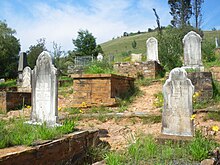Uitlander
Uitlander ( Afrikaans for "foreigners"; plural Uitlanders ) was the name for foreign migrant workers in the South African Republic or Transvaal in the late 19th century. They were mostly British citizens and, unlike the native male Boers who were called Burgher , had limited rights. This restriction was used by the British as a reason for the start of the Second Boer War .
history
From 1873 gold discoveries at Pilgrim's Rest and Barberton in the eastern Transvaal led to an influx of adventurers to the Transvaal. In 1886 large gold deposits were discovered in the Witwatersrand , which attracted numerous people, especially from Europe and the British Cape Colony . After all, the number of immigrants was about twice as high as that of Burgher. Most of them settled on the Witwatersrand, while many Burgher lived in the country. In 1896, 50,907 whites were counted in Johannesburg in the center of the Witwatersrand, including only 6,205 Burgher, but over 16,000 British, around 15,000 citizens of the Cape Colony, 3,300 Russian and Lithuanian Jews and 2,200 Germans.
The Transvaal government under Paul Kruger saw the independence of the republic in danger. She denied the Uitlanders the right to vote in order to prevent them from joining the Cape Colony. In 1890 a law was passed that granted Uitlanders full voting rights for the First Volksraad only after 14 years of residence and at the age of 40 . The "Second Volksraad" was set up for the Uitlanders and was only responsible for municipal issues in Johannesburg and the surrounding area. He was also based in the Ou Raadsaal in Pretoria , but his decisions could be overruled by the First Volksraad. At the same time high taxes were levied; public administration proved ineffective and also gave rise to general discontent among the Uitlanders. As a result, the Jameson Raid took place in 1895 . Cecil Rhodes , the prime minister of the Cape Colony, planned this invasion and initiated a Uitlander uprising in order to be able to conquer the area. Few Uitlanders supported the uprising, however, and Jameson's forces were quickly defeated.
From 1897 the British High Commissioner for Southern Africa , Sir Alfred Milner , and the Colonial Minister Joseph Chamberlain used the lack of civil rights as an excuse to put pressure on the Transvaal. They insisted on the claims of the Uitlanders and indirectly threatened war. In 1899 the Second Boer War broke out, at the end of which in 1902 the Transvaal was annexed by the British . All residents of the Transvaal became British citizens; the expression "Uitlander" became obsolete.
literature
- JS Marais: The Fall of Kruger's Republic. Clarendon Press, 1961. Digitized
Web links
- Imperialism in the dock - the Boer War (English)
- The right to vote in Transvaal at sahistory.org.za (English)
